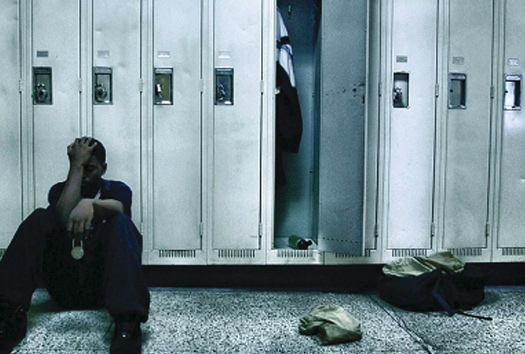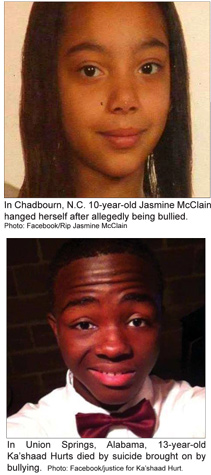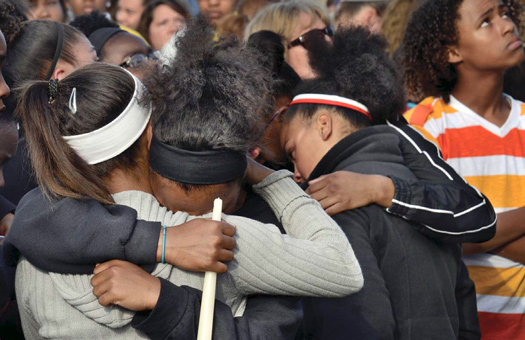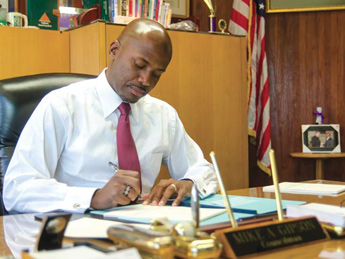By Charlene Muhammad CHARLENEM

Fears a proposed Anti-Bullying Ordinance will criminalize children
CARSON, Calif. (FinalCall.com) – Physically bully or cyberbully any school age children from kindergarten through 25 in Carson and you’ll be fined and/or charged with a misdemeanor, if a proposed law passes in City Council on May 20.
The law, which would become effective on June 19, would apply to anyone who retaliates against anyone who report incidents. It’s an effort to prevent the type of physical and mental harm from bullying that leads to depression and sometimes death, Carson city officials said.

“It’s putting it on the parents to take responsibility for your child. We don’t want any child to be placed in a position where he or she has to commit suicide because of what someone has done or said to them as a result of bullying,” stated Councilman Mike Gipson.
Education and juvenile justice advocates expressed concerns to The Final Call that the ordinance, though well-intentioned, would only make way for wayward law enforcement to further criminalize Black and Brown youth.
Not so, said Councilman Gipson, who proposed the anti-bullying ordinance after becoming fed up with the deaths of children including two young Black males, one in Carson and one in Compton, who committed suicide after being bullied. And three years ago in Monterey, one young man, whom he identified simply as “Angel,” was killed with a gunshot to the head in math class, he said.
If kindergartener’s are bullying and parents are fined, it would cease to exist, he said. Parents would have to pay $100 for the first infraction, $200 for the second, and the third would be a fine and counseling for the entire family, he explained. Anyone between 18-25 who participates in or encourages bullying or cyberbullying would also face misdemeanor charges.
Punishment for punishment’s sake is futile, said civil rights advocate Attorney Judith Browne Dianis, co-director of the Advancement Project. The multi-racial civil rights organization advocates for community-based solutions through public education and legal analysis campaigns.
“We are a punishment nation and one thing that we should have learned from the failed war on drugs is that punishment does not change people, and this incarceration nation has gone the wrong way,” she stated.
America has forgotten about reduction, rehabilitation, she said, but in criminal justice reform, people are starting to recognize that and return to the framework of rehabilitation. Unfortunately, the message of rehabilitation is not catching up where children are concerned, she argued.

The result’s have been a rush to criminalize youth, who should receive the most latitude and tolerance, Atty. Browne Dianis said.
In addition, the term “bullying” is very subjective and in the eye of the beholder, which presents just one problem with using suspensions and arrests as deterrents, Atty. Browne Dianis added. And punishing youth won’t change the behavior, she said.
Solutions lie in getting at root causes and giving youth the tools they need to feel they can stand up to bullying and speak out against it, she offered. It’s also important to help those who bully understand the impact of their behavior and equip them with the resources to change.

“Criminalizing it or even using strict discipline around it doesn’t do those two things. It doesn’t give them understanding, doesn’t give them new behaviors and that’s where we go wrong with young people all the time. We just want to punish, punish, punish instead of taking the time to teach,” Atty. Browne Dianis told The Final Call.
She acknowledged there have been very tragic incidents with youth who were bullied that have raised the visibility and changed the conversation about the crisis and its impact. But society’s problem is not developing common sense solutions that disregard child or adolescent development, she said.
“Punishment sets them up to become part of the incarceration nation and become another statistic. And it’s the easiest thing to do, to just punish someone, get them out of your face and you don’t have to deal with them anymore. It’s harder to actually try and change behavior,” stated Atty. Browne Dianis.
The ordinance sets a dangerous precedent, insisted Gwen Samuel, education advocate and founder of the Connecticut Parents Union.
It opens the gate for already over aggressive police officers to abuse already vulnerable children, as witnessed with recent incidents, including the recent alleged police attack on a 13-year-old in Florida.
On May 16, community groups in Florida, including the Dream Defenders (youth and student organizers who advocate for social change through nonviolent civil disobedience, civic engagement, and direct action), condemned the act caught on video tape.
Depicted are officers who allegedly handcuffed, choked, and violently kicked the teenager for opening the window on his school bus to prevent an asthma attack, according to a press release issued by the Dream Defenders. They say the act is part of a broader pattern of police brutality and the painful realities of the school-to-prison pipeline in the state.
“Parents of Carson should be concerned because it’s four-years-old now, but what could come after that, arresting parents because the child is predisposed to danger in the womb?” she said.
Ms. Samuel feels the ordinance gives children no room to work through their natural impulses and everyday growing pains.
It also sets up the ability for law enforcement to violate children’s constitutional rights, she said. “Can you imagine a child that doesn’t know their own phone number at five-years-old? They barely know their address. Do you think they’re going to know they have the right to remain silent?” she argued.

Subscribe To The Final Call Today!
Ms. Samuel recommended positive support solutions through programs created by advocates who understand youth and child development.
Council member Gipson emphasized Carson officials are addressing the issue of prevention through parent accountability to their own children who need help and to their children’s victims.
Parents will have to prove they have undergone a specific number of counseling to address the issue, he said, but children would go to juvenile court based on their age and if their level of bullying goes into criminal action.
“I mean, five-year-olds, take scissors and stab kids in school. They take pencils and staplers. Should we not do anything about that? Should we not recognize that maybe there’s a behavior problem that exists? What about the kid whose eye gets pulled out or stabbed as a result of a five-year-old,” Councilman Gipson argued.
He said the ordinance is not talking about taking a gun and killing somebody as a bully, but about someone taunting, abusing, pulling hair.
“We’re talking about someone who is physically or emotionally or verbally abusing another young person and those issues will be handled in juvenile court by a juvenile judge as well as counselors,” he continued.
Council member Gipson directed critics of the ordinance to tragedies like Columbine High School, where two students in Colorado (Dylan Klebold and Eric Harris) killed 12 students and themselves, and injured 21 others during an all-out assault in 1999.
“For people, naysayers who’ve misunderstood … they don’t have to bury. They don’t have to make the funeral arrangements. They don’t have to say a final goodbye to their child. They don’t have to be the kid who is in school who was bullied and now a kid is coming to school with a gun to take his aggression out on the bully and accidentally shoot other kids,” he stated.












